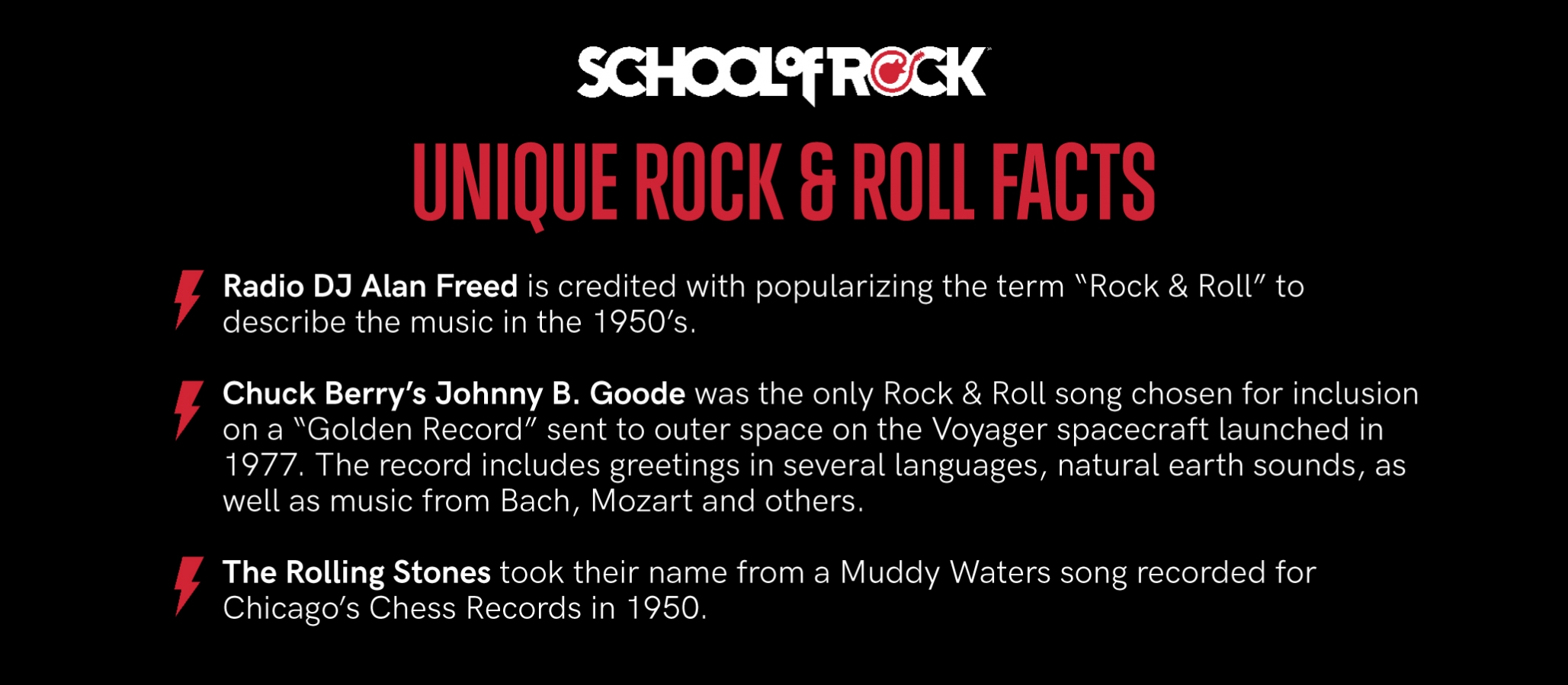What is rock and what makes it so unique? For over 70 years rock music has dominated the airwaves and concert venues, making it the soundtrack for generations of fans. The history of rock is found in its sound, cultural importance, and uniqueness among all music genres.

Rock and Roll: A History
Rock and roll has its roots in many different styles - blues, gospel, R&B, country, etc. Depending on who you ask, what we have come to know as rock and roll most likely began either in the late 1940s or early 1950s. This long history was, and continues to be, one of the most important parts of what makes rock music so unique.
Some of rock and roll's early stars include Chuck Berry, Little Richard, Fats Domino, and Bill Haley & The Comets. Of course, we can’t forget the legends who came out of Sun Records in Memphis, notably Elvis Presley, Carl Perkins, and Jerry Lee Lewis.
To get a taste of what rock sounded like in the early days, listen to classics like Chuck Berry’s “Johnny B. Goode,” Elvis Presley’s “Jailhouse Rock,” and Little Richard’s “Tutti Frutti.”
From there, rock and roll went international. Bands like The Beatles, The Rolling Stones, and The Who launched a new musical revolution in the 1960s, gaining scores of American fans in what was dubbed “The British Invasion.” Other important British bands of the era include Led Zeppelin, Pink Floyd, and The Kinks. Even Jimi Hendrix went to England to make it big, with two-thirds of the Jimi Hendrix Experience being Englishmen!
In the 1970s, rock became bigger than ever, filling stadiums and arenas around the world. Marshall stacks blared and lead singers wailed for millions of adoring fans. The sound became bigger as well, with bands like Queen combining the energy and sound of rock with theatrics reminiscent of an opera. Others, like Bruce Springsteen and Tom Petty, went back to the basics with tight bands and great songs. Later in the decade, punk would take things a step further, giving the spirit of rock a new, brash edge.
Everything was bigger in the ‘80s, including rock. Big hair, big drums, and loud, fast guitars. From innovative virtuosos like Eddie Van Halen and Randy Rhoads to throwback rockers like Slash, rock continued to get heavier and more bombastic. Heavy metal took rock to its extreme, powered by bands like Metallica and Iron Maiden. But on the indie scene, there were also bands like The Cure and REM crafting a darker and more nuanced sound.
The ‘90s brought new styles of alternative and grunge to the rock scene, combining the energy of punk with classic rock. Bands from Seattle like Nirvana and Pearl Jam made rock feel alive and important after the excess of the ‘80s. Later, bands like Korn, Limp Bizkit, and The Deftones developed a heavier rock sound based on 7-string guitars, garbled vocals, and unique rhythms.
Though rock has waned in popularity in recent years compared to hip-hop and other styles, it continues to evolve in unique ways, from emo to rap/rock and industrial. Though many have tried to proclaim the death of rock and roll over the years, it remains alive and well.
Identifying What Makes Rock Music Unique
Rock music is famous for having a strong backbeat, usually in 4/4 rhythm, although more progressive styles can employ trickier time signatures. As opposed to jazz, the drums and bass in rock usually lock in with each other and stick to a tight pattern.
Instrumentally, guitars are typically the main voice in rock. Overdriven power chords and shredding solos are synonymous with the genre. What do you think of when you hear the term “Rock Star”? Typically a leather-clad guitarist like Slash or Jimi Hendrix standing in front of a wall of Marshalls.
For vocalists, rock music is probably the most aggressive. From Robert Plant to Axl Rose, rock singers WAIL. They have to be loud—and often high-pitched—to get above the loud guitars and pounding drums.
While rock as a genre is incredibly diverse, most rock music sets itself apart through its aggression, energy, and sheer volume.

The Sound Makes Rock Music Unique
The sound of rock largely depends on the era, but most rock from the early days and on features loud, overdriven guitars. From Chuck Berry to Tom Morello, rock guitarists like to turn it up!
The early sound of rock guitar was like blues on steroids, and British bands like Cream and Led Zeppelin took things a step further. Later on, guitarists like Eddie Van Halen expanded the notion of what an electric guitar could sound like with his two-handed tapping technique. Modern guitarists like Tom Morello and the Edge employ effects pedals and other sonic wizardry to take things even further out.
But talking about sound is one thing; most of us know rock when we hear it. Listen to “Johnny B. Goode” by Chuck Berry. The opening, overdriven riff set the template for rock guitar that has been copied by almost every rock guitarist since. Or “Back in Black” by AC/DC. Those power chords. The pounding, steady drums. Rough, wailing vocals. And of course a great guitar solo. That’s rock. How about “Falling Away From Me” by Korn? While it’s a long way from Chuck Berry, the ingredients of rock are still there—pounding drums and heavy overdriven chords accompanied by intense vocals. Those three songs span some 50 years and sound almost nothing alike, yet they are all considered rock. Proving once again that if it rocks, it’s rock!
The Energy Makes Rock Music Unique
While every genre of music is capable of having lots of energy, rock is particularly known for consistently kicking things up a notch. That is why people listen to Rage Against the Machine’s “Killing in the Name Of” during a workout to get hyped up, instead of Mozart’s Requiem in D Minor.
Many sub-genres of rock started as a backlash to older styles getting tired. Punk and heavy metal took things to a new, aggressive level in the late ‘70s in response to disco and the fading classic rock of the day. Grunge took down hair metal in the early ‘90s, bringing a fresh energy to the genre. In the 2000s, bands like The White Stripes really brought things back to the basics with just drums and guitar, and it was a much-needed jolt to the system.
Whether it’s The Beatles with “Helter Skelter” or Pantera with “Walk,” rock music brings the energy like no other.

The Importance of Rock
So what makes rock music unique? Is it important? Well, I think so, for at least 3 reasons:
- Giving Voice to the Youth
- Bridging Racial Divides
- Political Protest
Giving Voice to the Youth
Rock and roll was the first music that really gave young people a voice. Before rock, most popular styles were marketed to adults and usually enjoyed in adult spaces like bars and juke joints. But the generation that came of age in the ‘50s after World War II, and the spare time they had to devote to music, was a huge part of what makes rock music so unique in the modern world.
Artists like Elvis Presley and Ricky Nelson spoke to teenagers of that generation, partly because they weren’t that much older themselves. The Beach Boys and The Beatles did the same thing for adolescents in the ‘60s. Rock and roll began as young people’s music, and parents just didn’t understand.
Bridging Racial Divides
Another way rock music is unique is in bridging racial divides. Before rock, music was mainly marketed along racial lines, with “Race” records marketed to black audiences, and “Hillbilly” records marketed to white audiences. But artists like Elvis Presley and Jerry Lee Lewis listened to it all, and both covered songs written by African Americans or adopted stylistic attributes from blues and R&B artists. At the same time, Black rock and roll artists like Bo Diddley, Little Richard, and Chuck Berry were popular among both Black and white kids. For many suburban whites, it was the first time they were exposed to these styles. Indeed, that is one of the reasons some authority figures at the time thought rock and roll was dangerous.
Later in the ‘60s you began to see more racially integrated rock groups like The Jimi Hendrix Experience and The Allman Brothers Band. The Hippie movement embraced more racially liberal views and rock music of that era was keenly aware of the struggles of the Civil Rights Movement. This brings us to our third point…
Rock as Protest Music
Rock music has been a powerful voice of protest in America. From outrage over Vietnam at huge festivals like Woodstock to the political activism of bands like Pearl Jam, rock artists have often been outspoken in their views. Neil Young wrote “Ohio” in response to the National Guard fatally shooting four students at Kent State University. U2 addressed political violence in Northern Ireland in “Sunday Bloody Sunday.” And Rage Against the Machine basically made a career out of turning political protest into rock anthems.
For those reasons and many others, rock has been and continues to be vitally important to the culture worldwide.

About the Author
Nick Swan has over 25 years of experience playing guitar and has taught at School of Rock Knoxville. As a guitar teacher, Nick specializes in all styles of classic rock, blues, and country, with the goal of always putting the song first.



